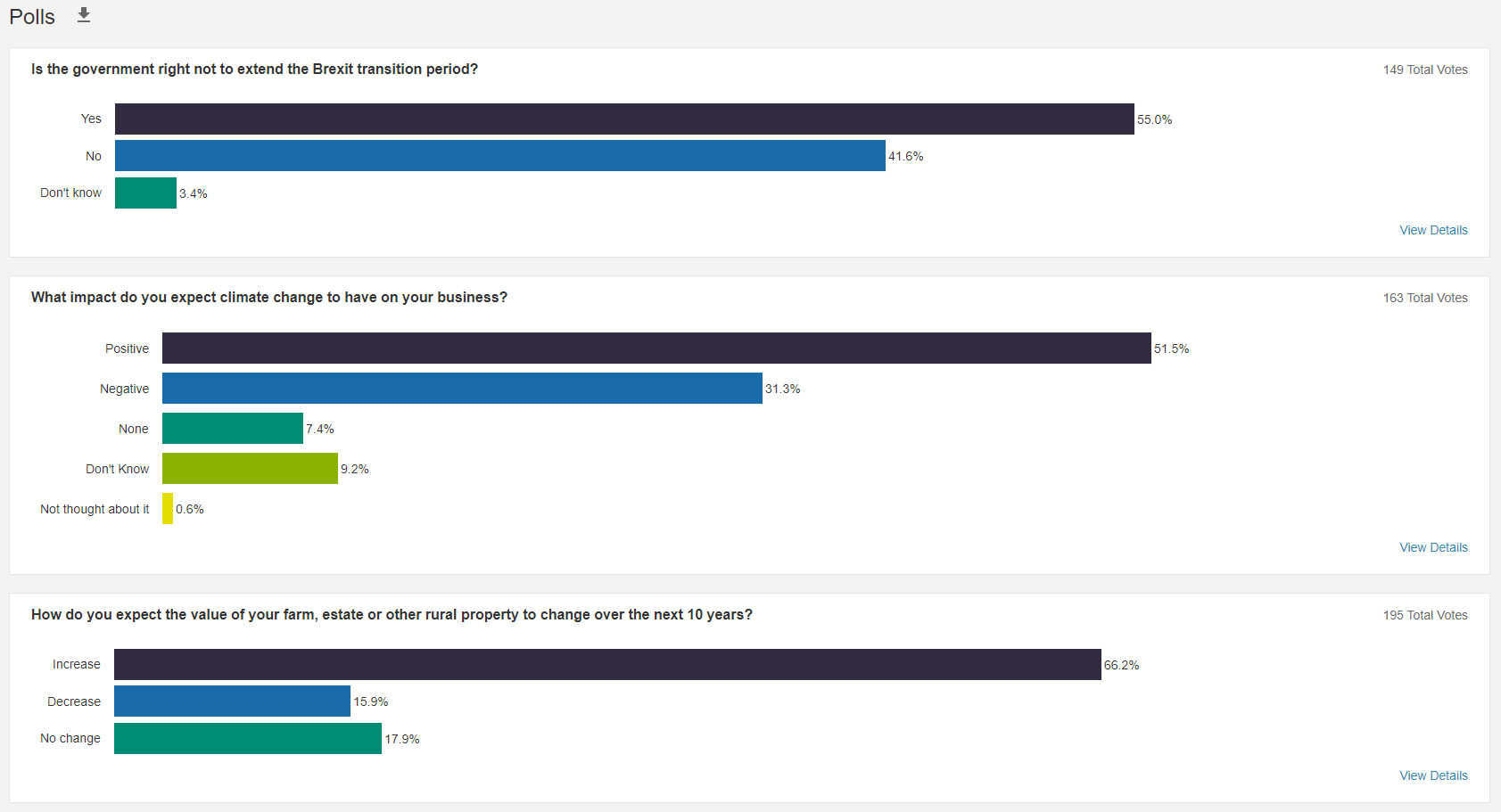Covid 19 – Rural property and business update Monday 29th June
The following is a brief round-up of some of the current issues affecting rural property owners and businesses
4 minutes to read
Commodity prices
The biggest mover in our commodity price round up this week was the price of red diesel – up 7%. This is a reflection that the global economy is starting to move again as Covid-19 lockdowns are relaxed around the world.
It’s yet to be reflected in average UK farm-gate prices, but improving prospects for the US harvest is set to put some pressure on wheat crops, says grain trader Frontier.
Dry, sunny weather means combines have already started bringing in the winter barley in parts of south-west England.

The Rural Report launches with successful webinar
The rehearsals were a bit shambolic, but our team pulled it out of the bag when we launched The Rural Report - our flagship publication for anybody who owns or has an interest in rural property - with a new-fangled webinar for the first time last week.
If you missed it, you can watch a recording of the webinar, which featured Tom Heathcote, our Head of Agri-Consultancy; Alice Huxley from our Valuations team, Clive Hopkins, who runs Knight Frank’s Farms & Estates team, and myself.
There was plenty of audience participation with viewers invited to take part in three polls during the session. The results, as shown below, were fascinating, in particular the response to the question about climate change that saw a majority saying climate change will be beneficial for their businesses.

To read all the articles online or request a copy of The Rural Report, which is packed full of insight, thought-provoking opinions and advice, please head to www.knightfrank.co.uk/ruralreport
Trade and food standards
The chlorinated chicken saga rumbles on. James Bailey, the new boss of Waitrose, has chucked his penny’s worth into the ring by stating categorically that the upmarket grocer will never sell chlorinated chucks.
His support will be welcomed by those campaigning to ban food imports that don’t match the standards demanded of farmers here. However, it is unlikely that the much-maligned fowls would ever find their way onto Mr Bailey’s shelves anyway.
They are more likely destined for the manufacturing sector where they’d end up in ready meals and pies where it is harder for consumers to know the provenance of what they are eating. The US insists, as part of a trade deal, that it won’t allow its exports to be labelled as chlorinated or hormone treated.
Hope are also rising that Boris Johnson is going to pull a trade deal with the EU out of his hat. Although many are still resigned to a no-deal departure from the Brexit transition period, which ends at the end of the year, a poll of 26 “market strategists” (your guess is as good as mine) by Bloomberg suggests a 55% chance of a deal happening.
Why, given the seemingly intractable red lines drawn by both parties? This article from Prospect magazine explains why it’s not as unlikely as it sounds.
If securing a deal with our biggest trading partner and negotiating with Donald Trump wasn’t enough to keep Trade Minister Liz Truss on her toes, Japan has given the UK until the end of July to agree a free trade agreement. Such a tight deadline seems to scotch the likelihood of cuts to the tariffs and quotas that make it hard for UK farmers to export things like cheese and beef to the land of the rising sun.
Government unveils food and drink “Bounce back” plan
Meanwhile, the farming industry has extended a relatively cool welcome to a new cross-ministry initiative from Defra and the Department for International Trade to “turbo-charge” the food and drink industry post Covid-19.
Exports fell by over £700 million year-on-year in the first quarter of the year, according to the Food and Drink Federation.
No new cash is on offer for farmers and food businesses, but there will be masterclasses and clinics to hep exporters take advantage of the opportunities offered by the trade deals currently being negotiated with the US, Japan, Australia and New Zealand.
Such initiatives are, of course, welcome, but grabbing the low-hanging fruit first – maintaining our preferential access to the huge established market on our doorstep – would seem the most sensible way to help producers here.
Gas safety judgement beneficial for landlords
My colleague Alastair Paul, who heads our Rural Asset Management team in the East, has flagged up an interesting judgement by the Court of Appeal that he says could be relevant to farms or estates with residential properties in their rental portfolios.
Legal eagles can read the full judgement, but from my understanding it basically means that a landlord isn’t precluded from serving a Section 21 notice on a tenant if they didn’t provide a gas safety record prior to occupation.
“Estate and farms are unusual as residential landlords as they often use their houses for staff. Sometimes let houses are required back in hand quite quickly,” points out Alastair.
“Serving notice on tenants has become a complicated and technical business and the smallest error in timing or in the wording of the notice causes significant issues.
“The recent Trecarrell House Limited v Patricia Rouncefield case is helpful to landlords, but life is very much easier if you get notices just right in the first place,” he urges.
For more information do drop Alastair a line.